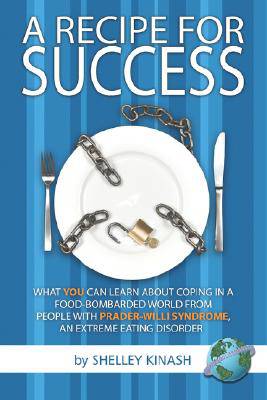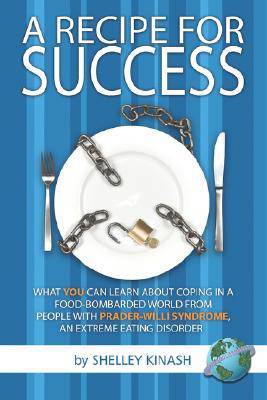
- Retrait gratuit dans votre magasin Club
- 7.000.000 titres dans notre catalogue
- Payer en toute sécurité
- Toujours un magasin près de chez vous
- Retrait gratuit dans votre magasin Club
- 7.000.000 titres dans notre catalogue
- Payer en toute sécurité
- Toujours un magasin près de chez vous
A Recipe for Success
What You Can Learn about Coping in a Food-Bombarded World from People with Prader-Willi Syndrome, an Extreme Eating Di
Shelley Kinash
Livre broché | Anglais
84,95 €
+ 169 points
Format
Description
In North America, 64% of adults and 25% of children are overweight or obese. We are bombarded by food; it is everywhere we turn. People with Prader-Willi syndrome (PWS) are an untapped expertise in combatting this problem. People with this genetic disorder gain approximately 20-30% more weight on 50% less calories, and are driven to eat. The traditional approach to this syndrome was to lock up all food, and control, restrict, and supervise all activity. While people with PWS were kept alive, they had no quality of life. Today, there are leaders within the PWS community who are taking cutting-edge approaches to combating both health and quality of life issues. Their secrets are revealed within this book. "In 1999 the World Bank asked 60,000 people living on less than a dollar a day to identify the biggest hurdle to their advancement. It wasn't food, shelter or health care. It was access to a voice." www.videovolunteers.org In 2007 Albertans with Prader-Willi syndrome and their families were interviewed and they made the same plea. Prader-Willi syndrome is a genetic condition with a complex presentation of characteristics including a body chemistry that is a poor compliment to a pronounced food desire. However, the people interviewed did not ask for a new diet, or rehabilitation strategies. They asked that people listen. By empowering persons with Prader-Willi syndrome and their families to tell their stories, A Recipe For Success gives a voice to those who have been unheard, and inspires the people who fi ght for them. This book is a must read for anyone seeking; a cutting-edge approach to societal health and wellness; an answer to weight maintenance for themselves or someone they love, and/or; a means of supporting persons with disabling conditions such as Prader-Willi syndrome and beyond to achieve meaningful, healthy lives. This book explores health and wellness, with an emphasis on food drive, as well as disability culture, through the voices of self-advocates with PWS and families. It should be read by: . Parents of all children (disabled and not) who want to instill positive, healthy food practices. . Adults who have attempted diets and still not lost the weight. Adults who are seeking an alternate approach. . Doctors and other medical professionals who seek continuing education. . Teachers who are negotiating the balance between organic and teachable conditions. . Self-advocates with disabling conditions who want to explore their own personal voice through the voices of others experiencing stigma and oppression. . Family members of persons with disabling conditions who want to affirm their experiences and interpretations and learn how to navigate the systems. . Government administrators who want to inform their funding allocation. . Extended family, friends, and the public-at-large who want to understand disability and reexamine their attitudes. . Human service workers who want to know how best to support persons with disabling conditions and how to listen to families. . Anyone who wants to know about Prader-Willi Syndrome.
Spécifications
Parties prenantes
- Auteur(s) :
- Editeur:
Contenu
- Nombre de pages :
- 132
- Langue:
- Anglais
Caractéristiques
- EAN:
- 9781593118433
- Date de parution :
- 06-09-07
- Format:
- Livre broché
- Format numérique:
- Trade paperback (VS)
- Dimensions :
- 156 mm x 234 mm
- Poids :
- 195 g







